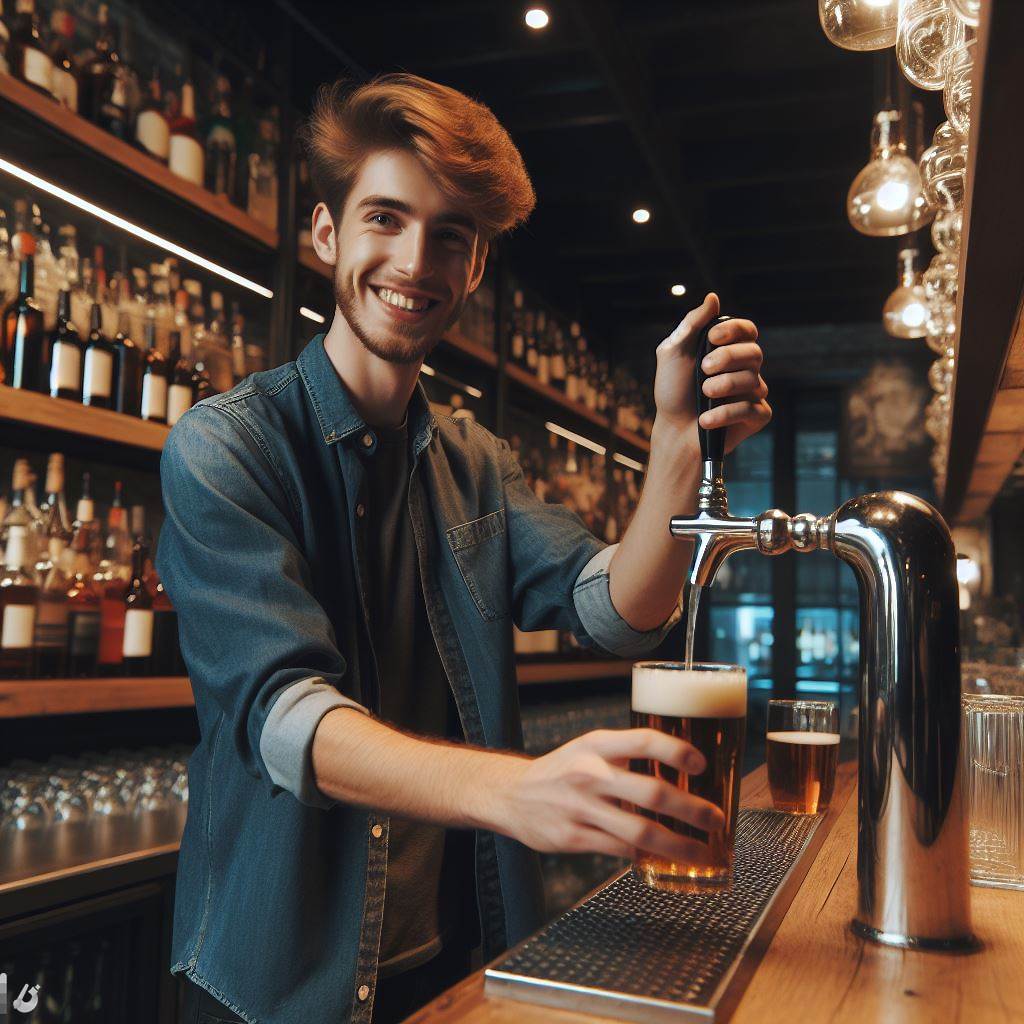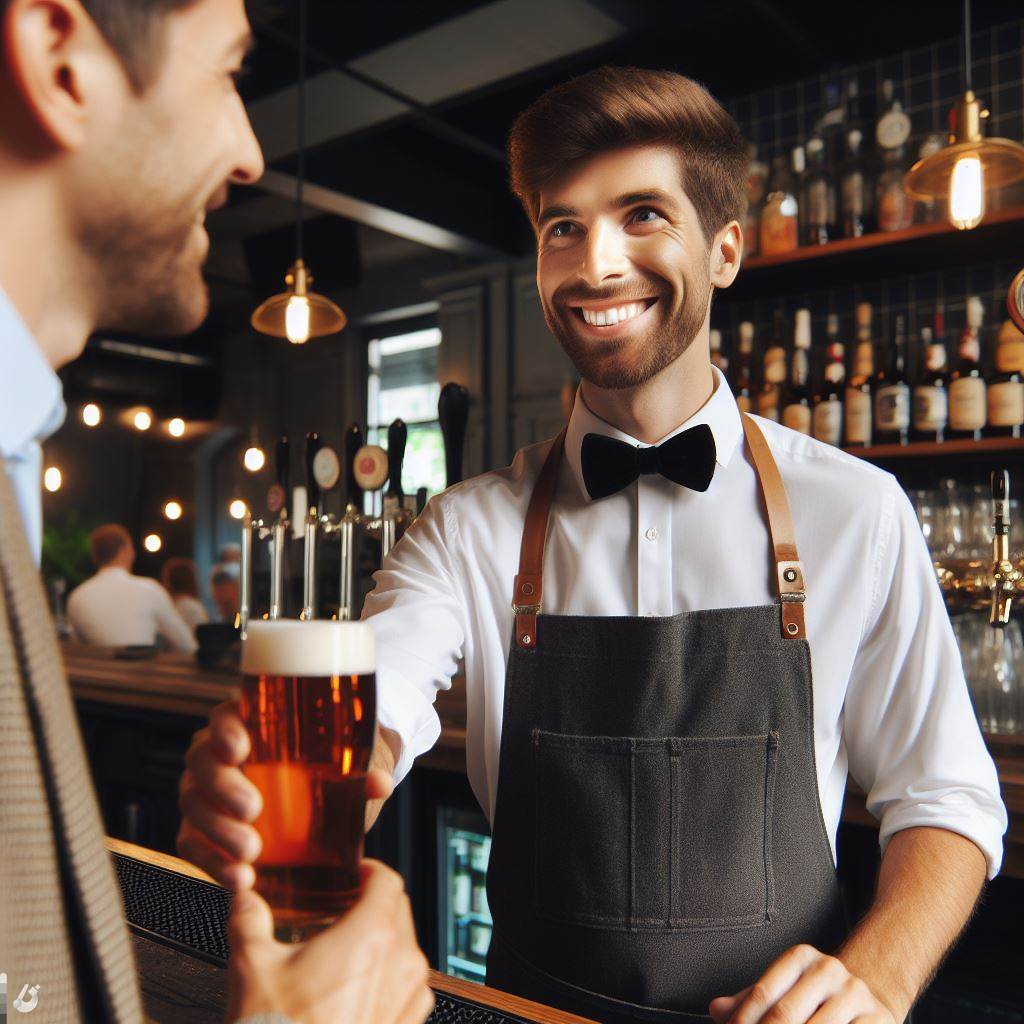Introduction
In this blog post, we will dive into the day-to-day experiences of UK bartenders.
Understanding their routines and challenges is important for anyone interested in the hospitality industry.
Step behind the polished bar counters and witness the captivating narrative of a UK bartender’s daily odyssey.
In this immersive exploration, we uncover the intoxicating blend of artistry, precision, and camaraderie that defines the life of those who craft the perfect pour.
As dusk falls, the neon lights flicker to life, casting a warm glow on the array of spirits lining the shelves.
It’s the bewitching hour when mixology meets storytelling, and each cocktail narrates a tale of expertise and innovation.
From shaken classics to stirred novelties, the bartender’s canvas is as diverse as the patrons who gather.
Join us as we shadow these modern alchemists, discovering the secrets of balancing flavors, mastering the shake and stir, and navigating the ebb and flow of a bustling bar.
Beyond the clinking glasses and effervescent laughter lies a world of passion, where every twist of the bottle cap is a section in their unique saga.
Embark on this sensory journey as we uncover the untold stories, the challenges, and the triumphs that shape the daily grind of a UK bartender.
Welcome to the heart and soul of mixology—the real, vibrant tales from behind the bar.
Join us as we explore the real stories of these hardworking professionals.
Overview of the profession
A general description of what it means to be a bartender in the UK
In the UK, being a bartender means serving drinks and providing excellent customer service.
Skills and qualifications required for the job
- Strong knowledge of different types of alcoholic and non-alcoholic beverages.
- Excellent communication and interpersonal skills to engage with customers.
- Physical stamina for long hours on one’s feet and ability to work in a fast-paced environment.
- Attention to detail for accurately taking orders and preparing drinks to customers’ specifications.
- Ability to multitask and work under pressure during busy periods.
Becoming a bartender typically does not require formal qualifications or a specific degree.
Personalized UK Career Consulting
Receive tailored career guidance designed just for you. Get actionable steps and expert support to boost your career in 1-3 days. Take control of your career now.
Get StartedHowever, employers often prefer candidates with relevant experience working in the hospitality industry.
Many bartenders start as barbacks or servers before advancing to a bartending position.
Skills and qualifications that can enhance job prospects
- Completion of bartending courses or certifications to gain knowledge about cocktail-making and mixology.
- Familiarity with various types of glassware, garnishes, and cocktail recipes.
- Basic math skills to calculate bills, handle cash, and give correct change.
- Knowledge of health and safety regulations to ensure a clean and safe working environment.
Additionally, bartenders in the UK must be at least 18 years old due to the legal drinking age.
To excel in this profession, bartenders need to be friendly, personable, and able to handle difficult situations.
Being able to handle intoxicated customers and defuse potential conflicts is also essential.
Bartenders often work unsociable hours, including late nights, weekends, and public holidays.
They may work in a variety of establishments, such as bars, pubs, hotels, clubs, or restaurants.
Overall, being a bartender in the UK requires a combination of social skills, drink knowledge, and physical endurance.
It is a dynamic profession that offers opportunities for growth and creativity in the ever-evolving world of mixology.
Read: How to Become an Event Planner in the UK
Morning routine
The typical morning routine of a UK bartender
A typical morning for a UK bartender is a flurry of activity, starting bright and early.
- Rise and shine: The alarm clock blares at the crack of dawn, and our bartender springs into action.
- Freshen up: After crawling out of bed, a quick shower and a strong cup of coffee are absolute necessities.
- Checking inventory: The first task of the morning involves inspecting the stock and taking inventory of all supplies.
- Restocking supplies: Once the inventory is complete, our bartender prepares a list of items needed and places orders accordingly.
- Organizing the bar area: Cleaning and setting up the bar area is crucial before the doors open for the day.
- Arranging glassware: The bartender meticulously arranges and polishes the array of glassware for the perfect presentation.
- Setting up the tools: The bartender positions the essential tools such as cocktail shakers, strainers, and jiggers within easy reach.
- Checking equipment: All the equipment, including the coffee machine, ice maker, and juicers, are carefully inspected for functionality.
- Preparing garnishes: Fresh fruits, herbs, and other garnishes are sliced, diced, and beautifully displayed to enhance the drinks.
- Reviewing the menu: A quick review of the menu allows the bartender to prepare for any questions or suggestions from customers.
- Pre-shift meeting: Before the doors open, the staff gathers for a brief meeting to discuss any updates or upcoming events.
- Final touches: With moments to spare, our bartender gives the bar area a last-minute check, making sure everything is pristine.
- Ready to serve: As the clock strikes opening time, our UK bartender is prepared to offer exceptional service to eager customers.
Overall, the morning routine of a UK bartender is a well-orchestrated symphony of preparation and attention to detail.
Read: UK Chef Work-Life Balance: Myth or Reality?
On-the-job responsibilities
The various responsibilities that bartenders in the UK have
Being a bartender in the UK comes with a diverse range of responsibilities.
Your Dream Job Starts with a Perfect CV
Get a tailored CV and cover letter that captures your unique strengths and stands out in your industry. Let us help you make an unforgettable first impression.
Get StartedFrom serving customers to managing transactions, bartenders play a crucial role in creating a memorable experience for patrons.
Taking orders
One of the primary responsibilities of a UK bartender is taking orders from customers.
They need to listen carefully, understand the preferences of each customer, and provide suggestions if needed.
This requires excellent communication and interpersonal skills.
Making drinks
Once the orders are taken, bartenders are responsible for crafting and serving a wide variety of drinks.
They must have a strong knowledge of mixology, including the ability to create classic cocktails as well as experiment with unique recipes.
Precision and attention to detail are essential for consistently delivering high-quality drinks.
Handling cash transactions
Bartenders also act as cashiers, managing the financial aspect of their job.
They handle cash transactions, including receiving payments from customers and providing change.
Accuracy and trustworthiness are crucial to avoid any errors or discrepancies.
Providing exceptional customer service
Beyond taking orders and making drinks, bartenders in the UK are expected to provide exceptional customer service.
They need to create a friendly and welcoming atmosphere, engage in conversations with customers, and ensure that their needs and preferences are met throughout their visit.
Maintaining cleanliness and organization
Bartenders are responsible for maintaining the cleanliness and organization of the bar area.
This includes regularly cleaning glasses, utensils, and the bar counter.
Optimize Your LinkedIn for Success
Boost your LinkedIn profile with a professional bio, keyword-rich headline, and strategic recommendations that attract recruiters. Stand out from the crowd and get noticed.
Optimize NowThey also need to restock supplies, such as garnishes, napkins, and straws, to ensure smooth operations.
Adhering to safety and legal regulations
Bartenders in the UK have a duty to comply with safety and legal regulations.
They need to be knowledgeable about responsible alcohol service, checking IDs to verify the legal drinking age, and refusing service to intoxicated customers.
It is their responsibility to create a safe environment for all patrons.
Collaborating with the bar team
Bartenders often work as part of a team, collaborating with other bar staff to ensure efficient operations.
They need to communicate with servers, barbacks, and managers to ensure a seamless flow of service.
Teamwork and effective communication are key to providing a great customer experience.
Upselling and promoting specials
Bartenders also play a role in promoting specials and upselling drinks to increase revenue.
They need to be knowledgeable about the bar’s offerings and know how to present them in an enticing manner.
Recommendations and suggestive selling techniques help to boost sales and enhance the overall experience.
Handling difficult situations
Bartenders may encounter challenging situations, such as dealing with unruly customers or resolving conflicts among patrons.
They need to remain calm, defuse tense situations, and seek assistance from security or management if necessary.
Proper conflict resolution skills ensure a safe and pleasant environment for all.
In short, bartending in the UK involves a wide range of responsibilities beyond just serving drinks.
From taking orders and managing cash transactions to maintaining cleanliness and providing excellent customer service, bartenders play a crucial role in the success of any bar.
Their dedication and skill contribute to creating a positive and enjoyable experience for patrons.
Read: Event Tech Trends in the UK Scene
Dealing with customers
Dealing with customers is a crucial aspect of being a UK bartender.
Customer service plays a vital role in ensuring a positive experience for patrons.
Bartenders must possess certain skills to handle various customer interactions and navigate difficult or stressful situations in the bar.
Importance of Customer Service
- Bartenders must prioritize customer service as it directly impacts the success of the establishment.
- Providing exceptional customer service leads to increased customer satisfaction and repeat business.
- A positive interaction with a bartender can significantly enhance the overall atmosphere and vibe of the bar.
Common Customer Interactions and Bartenders’ Approach
- Order Taking: Bartenders efficiently take orders, ensuring accuracy and attentiveness to each customer’s preferences.
- Menu Recommendations: Bartenders provide suggestions based on their knowledge of different drinks and customers’ preferences.
- Socializing and Engaging: Bartenders engage in conversation with customers, creating a warm and friendly environment.
- Problem Resolution: Bartenders address any customer complaints or issues promptly and professionally, striving to resolve them satisfactorily.
Skills Required to Handle Difficult Customers or Stressful Situations
- Patience: Bartenders should remain calm even in challenging situations, maintaining a positive demeanor.
- Active Listening: Listening attentively to customer concerns helps bartenders understand their needs and provide appropriate solutions.
- Empathy: Showing understanding towards customers’ feelings can de-escalate tense situations and build rapport.
- Conflict Resolution: Bartenders should possess conflict resolution skills to effectively manage disagreements and restore harmony.
- Time Management: Juggling multiple tasks efficiently ensures customers receive prompt service and minimizes wait times.
Ways bartenders can successfully navigate such scenarios
Handling difficult customers and stressful situations is an inevitable part of a bartender’s role.
However, by employing the skills mentioned above, bartenders can successfully navigate such scenarios:
- Remaining calm and composed, even if confronted with an irate or aggressive customer.
- Listening actively to customer grievances and concerns, offering reassurance and support.
- Empathizing with frustrated patrons, showing genuine understanding and a willingness to resolve issues.
- Attempting to defuse tense situations through humor or by diverting the customer’s attention.
- Seeking assistance from colleagues or management when dealing with particularly challenging customers.
- Respecting customer boundaries and personal space, ensuring interactions remain professional and appropriate.
- Taking responsibility for mistakes or errors, promptly apologizing and rectifying the situation to regain the customer’s trust.
- Communicating clearly and effectively, ensuring customers understand any limitations or restrictions imposed by the bar.
- Remaining organized and prioritizing tasks to manage busy periods efficiently, thereby reducing stress levels.
In essence, customer service is integral to the role of a UK bartender.
By providing outstanding service, bartenders contribute to a positive customer experience, fostering customer loyalty.
The skills required to handle difficult customers or stressful situations are essential for bartenders to maintain professionalism and ensure customer satisfaction.
Read: Essential Skills for UK Event Pros

Behind the scenes
In the bustling world of UK bartenders, there is more than meets the eye.
While customers enjoy their drinks and revel in the lively atmosphere, bartenders work diligently behind the scenes, ensuring a seamless experience for everyone.
In this section, we will shed light on the less visible aspects of being a UK bartender.
Teamwork and Collaboration
- Success in the bar industry relies heavily on teamwork and collaboration among bartenders.
- Bartenders, with their diverse skills and expertise, work together towards a common goal – customer satisfaction.
- Efficient communication and seamless coordination are key to providing exceptional service.
- Collaboration extends beyond bartenders and encompasses other staff members, such as waitstaff and kitchen staff.
- When everyone works together as a cohesive unit, the bar operates smoothly, even during peak hours.
Managing the Bar Area
- Managing the bar area is a challenging and multitasking endeavor that requires careful attention to detail.
- Bartenders must ensure that the bar is fully stocked with a diverse range of alcoholic and non-alcoholic beverages.
- They meticulously organize glassware, garnishes, and other bar tools to maintain a clean and efficient workspace.
- Regular inventory checks are necessary to prevent shortages and ensure a smooth workflow.
- They must also stay updated on the latest drink recipes and mixology trends to satisfy customers’ evolving preferences.
Overcoming Challenges
- Being a UK bartender comes with its fair share of challenges, requiring adaptability and quick thinking.
- Customer demands can be unpredictable, but bartenders must remain calm and provide excellent service under pressure.
- They often encounter difficult customers and must defuse tense situations with tact and professionalism.
- Managing time efficiently plays a crucial role in ensuring that customers are served promptly without compromising quality.
- Bartenders must also stay alert and adhere to strict alcohol service laws and regulations, maintaining a safe environment.
Behind the lively ambiance of a UK bar lies a world of hard work, collaboration, and dedication.
Bartenders form the backbone of this industry, relying on teamwork to provide exceptional service to their customers.
Managing the bar area and overcoming various challenges are integral parts of their role.
The next time you enjoy a refreshing drink at your favorite UK bar, remember the bartenders who work tirelessly behind the scenes to make your experience memorable.
Career Progression and Opportunities
Career growth and advancement in the UK bartending industry can be highly rewarding for those willing to put in the time and effort.
With various pathways available, individuals have the potential to climb the ladder and reach higher positions within the industry.
Potential for Career Growth
As a bartender gains experience and refines their skills, opportunities for career growth naturally arise.
Bars and establishments often value experienced staff members who have a deep understanding of mixology and customer service.
Head bartenders are responsible for overseeing the bar team, managing inventory, and creating new cocktail menus. This role requires excellent leadership and organizational skills.
One potential career progression is becoming a head bartender.
Another pathway is bar management. Bartenders who excel in their roles may be promoted to bar manager positions, where they are in charge of the entire bar operation.
Bar managers handle staff scheduling, budgeting, and maintaining high-quality service standards.
Additional Courses and Qualifications
Bartenders looking to enhance their career prospects can benefit from pursuing additional courses and qualifications.
These can provide a competitive edge and open doors to higher-level positions in the industry.
One popular qualification is the Certificate in Professional Bartending.
This comprehensive course covers advanced mixology techniques, bar management skills, and customer satisfaction strategies.
It equips bartenders with the knowledge and expertise needed to excel in their careers.
Another option is acquiring a Wine and Spirits Education Trust (WSET) certification.
This internationally recognized qualification deepens bartenders’ understanding of wines, spirits, and their production methods.
It can be especially beneficial for those aspiring to work in upscale cocktail bars or sommelier roles.
Specialized courses in cocktail making, flair bartending, and molecular mixology offer unique skill sets that can set bartenders apart from the competition.
These courses allow bartenders to experiment with innovative techniques and create exceptional drinks.
Embracing Opportunities
The UK bartending industry presents numerous opportunities for career progression and personal growth.
Bartenders who show dedication, enthusiasm, and a willingness to learn can quickly move up the ranks.
Networking is also crucial for accessing career opportunities.
Engaging with industry professionals, attending trade events, and joining bartending associations can lead to job offers and collaborations with renowned establishments.
Bartenders should be proactive in seeking new challenges and expanding their skill sets.
Volunteering to lead cocktail workshops, participating in mixology competitions, or creating signature cocktails can showcase their talent and attract potential employers.
In general, the UK bartending industry has the potential for significant career growth and advancement.
By investing in additional courses and qualifications, bartenders can increase their market value and open doors to higher-level positions.
Embracing opportunities, networking, and continually honing their craft are key elements to achieving success in this dynamic industry.
Real-life stories
In this section, we will share anecdotes and experiences from UK bartenders to provide a glimpse into the diverse range of experiences within the profession.
From humorous incidents to challenging situations, these stories highlight the unique perspectives and situations encountered by bartenders in the UK.
Anecdotes and experiences from UK bartenders
A Challenging Night at the Pub
One evening, a group of rowdy customers began causing trouble at the pub.
As the only bartender on duty, I had to handle the situation with tact and composure.
I called security and diffused the tension, ensuring everyone’s safety.
Unexpected Acts of Kindness
One heartwarming experience was when a regular customer left a generous tip and a note expressing gratitude for the attentive service.
It reminded me of the positive impact bartenders can have on people’s lives, even in small ways.
Dealing with Difficult Customers
A particularly demanding customer insisted on creating a custom cocktail that required ingredients not available at the bar.
Instead of turning them away, I went the extra mile to source the ingredients, impressing the customer and earning their loyalty.
An Unforgettable Proposal
A couple celebrating their anniversary visited the bar, and the gentleman asked for my assistance in arranging a surprise proposal.
I helped set up a romantic atmosphere, and witnessing their joyous moment made me appreciate the role bartenders can play in creating cherished memories.
Juggling Multiple Roles
During a busy night, a colleague called in sick, leaving me to handle both bartending and waitress duties.
It was a chaotic night, but it taught me the importance of adaptability and teamwork in a fast-paced environment.
The Power of Connection
An elderly gentleman regularly visited the bar, and we struck up conversations about his life and experiences.
Through our interactions, I realized the significance of creating meaningful connections with customers, as bartenders can become trusted confidants.
Handling Intoxicated Customers
One evening, a customer became heavily intoxicated and started behaving aggressively towards other patrons.
It was a challenging situation that required me to calmly diffuse the tension and ensure the safety of all customers until the authorities arrived.
Celebrating Life’s Milestones
A group of friends came together to celebrate a birthday at the bar.
Creating a festive atmosphere with special cocktails and personalized service added an extra touch to their celebration.
Witnessing their joy reminded me of the role bartenders play in making moments memorable.
The Art of Mixology
I had the opportunity to work alongside a talented mixologist who shared their knowledge and techniques.
Learning from their expertise opened my eyes to the intricate world of mixology and inspired me to continue refining my craft.
Turning a Passion into a Career
One bartender shared their journey of initially pursuing a different career path but eventually discovering their love for bartending.
Their story highlighted how bartending can provide a fulfilling and enjoyable profession for those passionate about the craft.
These real-life stories from UK bartenders showcase the range of experiences and challenges they encounter on a daily basis.
From handling difficult customers to creating memorable moments, bartending is a profession that requires adaptability, empathy, and a passion for connecting with people.
These stories remind us of the fascinating and diverse world behind the bar, making it much more than just pouring drinks.
Conclusion
In this blog post, we explored the day-to-day life of a UK bartender through real stories.
From the early morning preparations to the late nights serving customers, we learned that being a bartender is no easy task.
The main points discussed include the long hours, multitasking abilities, and the customer service skills required for success in this profession.
Understanding the challenges and demands of a UK bartender’s job is essential in appreciating their hard work and dedication.
We encourage readers to further explore this topic or share their own stories and experiences as both bartenders and customers.
By gaining a deeper understanding of the daily life of UK bartenders, we can better appreciate the art of mixology and the value of exceptional service in our favorite establishments.
Cheers to all the hardworking bartenders out there, and may we continue to support and celebrate the work they do!
[E-Book for Sale]
500 Cutting-Edge Tech Startup Ideas for 2024 & 2025: Innovate, Create, Dominate
$19.99 • 500 Tech Startup Ideas • 62 pages
You will get inspired with 500 innovative tech startup ideas for 2024 and 2025, complete with concise descriptions to help you kickstart your entrepreneurial journey in AI, Blockchain, IoT, Fintech, and AR/VR.




